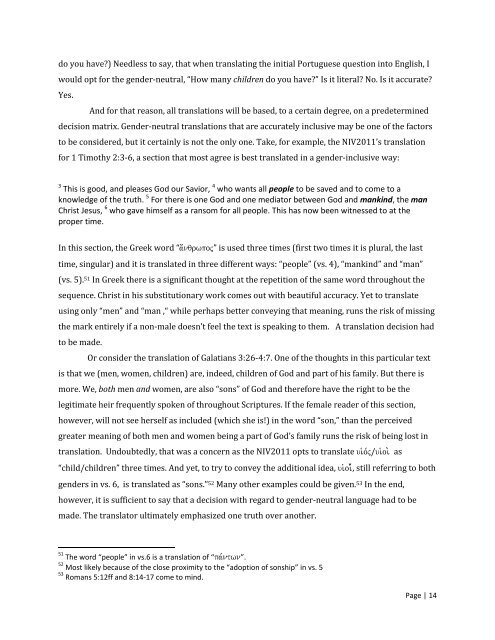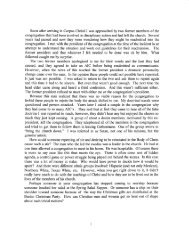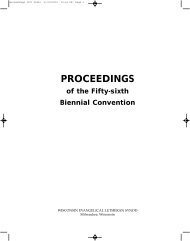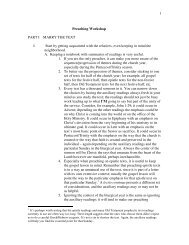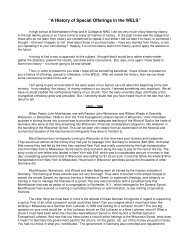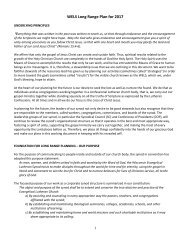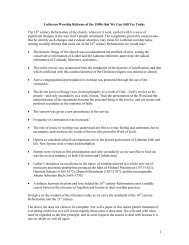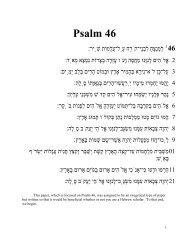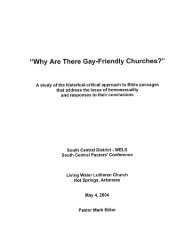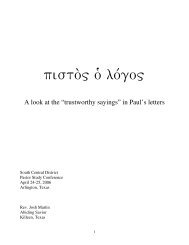A Brief Survey of the NIV 2011 and the Use of Gender-Neutral ...
A Brief Survey of the NIV 2011 and the Use of Gender-Neutral ...
A Brief Survey of the NIV 2011 and the Use of Gender-Neutral ...
You also want an ePaper? Increase the reach of your titles
YUMPU automatically turns print PDFs into web optimized ePapers that Google loves.
do you have?) Needless to say, that when translating <strong>the</strong> initial Portuguese question into English, I<br />
would opt for <strong>the</strong> gender-neutral, “How many children do you have?” Is it literal? No. Is it accurate?<br />
Yes.<br />
And for that reason, all translations will be based, to a certain degree, on a predetermined<br />
decision matrix. <strong>Gender</strong>-neutral translations that are accurately inclusive may be one <strong>of</strong> <strong>the</strong> factors<br />
to be considered, but it certainly is not <strong>the</strong> only one. Take, for example, <strong>the</strong> <strong>NIV</strong><strong>2011</strong>’s translation<br />
for 1 Timothy 2:3-6, a section that most agree is best translated in a gender-inclusive way:<br />
3 This is good, <strong>and</strong> pleases God our Savior, 4 who wants all people to be saved <strong>and</strong> to come to a<br />
knowledge <strong>of</strong> <strong>the</strong> truth. 5 For <strong>the</strong>re is one God <strong>and</strong> one mediator between God <strong>and</strong> mankind, <strong>the</strong> man<br />
Christ Jesus, 6 who gave himself as a ransom for all people. This has now been witnessed to at <strong>the</strong><br />
proper time.<br />
In this section, <strong>the</strong> Greek word “a;nqrwpoj” is used three times (first two times it is plural, <strong>the</strong> last<br />
time, singular) <strong>and</strong> it is translated in three different ways: “people” (vs. 4), “mankind” <strong>and</strong> “man”<br />
(vs. 5). 51 In Greek <strong>the</strong>re is a significant thought at <strong>the</strong> repetition <strong>of</strong> <strong>the</strong> same word throughout <strong>the</strong><br />
sequence. Christ in his substitutionary work comes out with beautiful accuracy. Yet to translate<br />
using only “men” <strong>and</strong> “man ,“ while perhaps better conveying that meaning, runs <strong>the</strong> risk <strong>of</strong> missing<br />
<strong>the</strong> mark entirely if a non-male doesn’t feel <strong>the</strong> text is speaking to <strong>the</strong>m. A translation decision had<br />
to be made.<br />
Or consider <strong>the</strong> translation <strong>of</strong> Galatians 3:26-4:7. One <strong>of</strong> <strong>the</strong> thoughts in this particular text<br />
is that we (men, women, children) are, indeed, children <strong>of</strong> God <strong>and</strong> part <strong>of</strong> his family. But <strong>the</strong>re is<br />
more. We, both men <strong>and</strong> women, are also “sons” <strong>of</strong> God <strong>and</strong> <strong>the</strong>refore have <strong>the</strong> right to be <strong>the</strong><br />
legitimate heir frequently spoken <strong>of</strong> throughout Scriptures. If <strong>the</strong> female reader <strong>of</strong> this section,<br />
however, will not see herself as included (which she is!) in <strong>the</strong> word “son,” than <strong>the</strong> perceived<br />
greater meaning <strong>of</strong> both men <strong>and</strong> women being a part <strong>of</strong> God’s family runs <strong>the</strong> risk <strong>of</strong> being lost in<br />
translation. Undoubtedly, that was a concern as <strong>the</strong> <strong>NIV</strong><strong>2011</strong> opts to translate ui`o,j/ui`oi. as<br />
“child/children” three times. And yet, to try to convey <strong>the</strong> additional idea, ui`oi,., still referring to both<br />
genders in vs. 6, is translated as “sons.” 52 Many o<strong>the</strong>r examples could be given. 53 In <strong>the</strong> end,<br />
however, it is sufficient to say that a decision with regard to gender-neutral language had to be<br />
made. The translator ultimately emphasized one truth over ano<strong>the</strong>r.<br />
51 The word “people” in vs.6 is a translation <strong>of</strong> “pa,ntwn”.<br />
52 Most likely because <strong>of</strong> <strong>the</strong> close proximity to <strong>the</strong> “adoption <strong>of</strong> sonship” in vs. 5<br />
53 Romans 5:12ff <strong>and</strong> 8:14-17 come to mind.<br />
Page | 14


